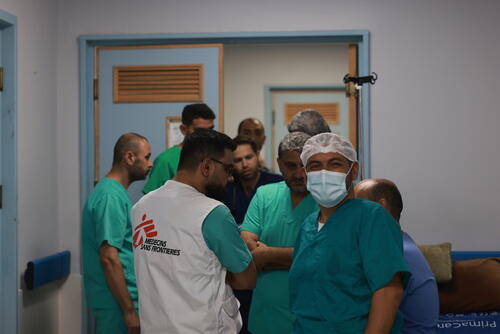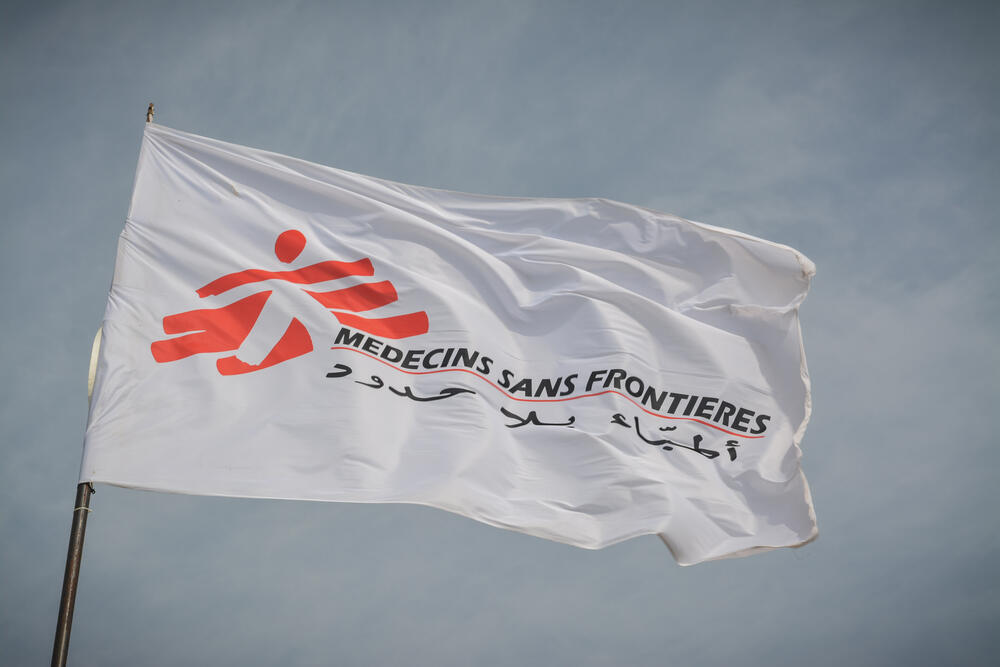Gaza: Polio Vaccination Update & MSF support Q&A
3 September 2024
Poliovirus has resurfaced in Gaza after 25 years, with positive samples from Khan Younis and Deir al-Balah in July 2024. Three children have shown signs of acute flaccid paralysis, and in August, an infant was confirmed with type-2 poliovirus. In response, the UN and Gaza's Ministry of Health are launching a two-round vaccination campaign. To ensure safe vaccinations, Israeli authorities have agreed to three 3-day military pauses in September.
What is polio and what is the difference between polio and polio 2?
Polio is a highly contagious disease that mainly affects young children. The virus enters through the mouth and multiplies in the intestine. Infected individuals shed poliovirus into the environment for several weeks, where it can spread rapidly through a community, especially in areas of poor sanitation. Infection is usually mild or asymptomatic but can result in a permanent Acute Flaccid Paralysis (AFP) if the central nervous system is involved, leading to spinal and respiratory paralysis, and in some cases death.
There are three variations of poliovirus, called wild poliovirus type 1, 2 and 3. Type 2 wild poliovirus was declared eradicated in September 2015, with the last virus detected in India in 1999. Symptomatically, all three strains are identical, in that they cause irreversible paralysis or even death.
Donate to the Gaza Emergency Regional Fund
Help provide vital medical care to those who need it most.

Why did the polio re-emerge in Gaza?
Since the start of the war, routine vaccinations have been disrupted because of the destruction of the Gazan health system by the Israeli forces, with health facilities unable to provide vaccinations. Due to the impact of the conflict, routine immunization coverage (for the second dose of inactivated polio vaccine) dropped from 99 per cent in 2022 to less than 90 per cent in the first quarter of 2024, according to the World Health Organization. As a result, most children born since 7 October have not received vaccinations, such as polio, measles and diphtheria.
The civilian infrastructure has been destroyed, including the water systems, cutting people off from safe water. 1.9 million people have been displaced, most living in deplorable and overcrowded conditions without access to proper sanitation and essential items such as soap and showers. Proper access to healthcare is extremely limited, leading to diseases outbreaks.
There is barely any possibility for the proper management of outbreaks as surveillance system, diagnosis of communicable diseases and isolation of patients is challenging. Israel’s blockade and continued obstruction of aid delivery have made it close to impossible for Gazans to access vital goods, such as fuel, food, water and medicines, which only further exacerbates the risk of outbreaks and diseases
Is MSF supporting the vaccination campaign?
For the duration of the vaccination, four Primary Health Care Centers (PHCC) located in Khan Younis and Deir Al Balah as well as the recently opened Al Zawaida MSF-supported Field Hospital in Deir Al Balah will serve as vaccination points. Our teams will host the vaccination teams from the Ministry of Health and provide health promotion, logistic and organizational support. Teams will also help through the installation of spaces for the cold chain equipment in a Primary health care center in Al Mawasi which serves as a distribution point for 11 vaccination centers around.
How will you inform people where and how to get vaccinated and how to reach the vaccination points?
Health cluster actors, WHO and Ministry of Health will be coordinating the campaign. MSF will only be providing logistical and organizational support at vaccination points. MSF health promoters will help relaying the information at community level and will direct families and children to their nearest vaccination points. At the vaccination point, MSF workers will also help controlling the crowd as we expect many people in the health facilities.
What are the main challenges for this vaccination campaign?
The three-day military pause announced by the Israeli authorities will probably not be enough time for the vaccination teams to carry out this vaccination campaign. In fact, access is a major challenge in Gaza given the destruction of road infrastructures and collapse of the overall health system. Medical and humanitarian organizations in collaboration with the Ministry of Health will have to organize the campaign in a context of severe lack of supplies and functional health structures.
In addition to this, the repeated strikes and attacks from Israeli forces represent a constant threat to both health workers and population. No later than a week ago, hundreds of patients in Al Aqsa hospital fled the hospital after an evacuation order was issued by the Israeli forces and an explosion hit 250m away from the hospital. Even in so-called humanitarian zones, which are supposed to be safe, repeated shelling and strikes occur, one recently reported 60 meters from an MSF vehicle. Even if the military pause is respected, the fear and insecurity provoked by these repeated attacks which also impact humanitarian convoys such as the shooting at WFP vehicle, represent a big challenge for both health workers organizing the vaccination campaign and the population to feel safe in accessing the vaccines.
Do you think the military pause will be respected?
We do not have guarantees that the military pause will be respected. Yet, the only solution to be able to provide humanitarian and health care to the population is an immediate and durable ceasefire.
What other health related issues you believe are important to treat in Gaza? Are there enough medication and health supplies to treat patients and people with chronic illnesses?
The population in Gaza live in extremely unsanitary and unhygienic conditions, which have a direct impact on their health. Our teams constantly see people with health with issues related to the lack of water and sanitation, such as skin infections and gastro-intestinal disorders.
Patients with chronic diseases such as hypertension, diabetes or renal failure are facing important challenges in accessing medications and follow up of their chronic illness which often require medical specialist and additional examinations (laboratory test for example).
